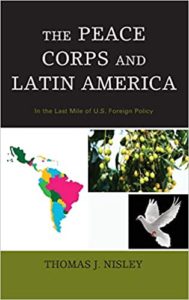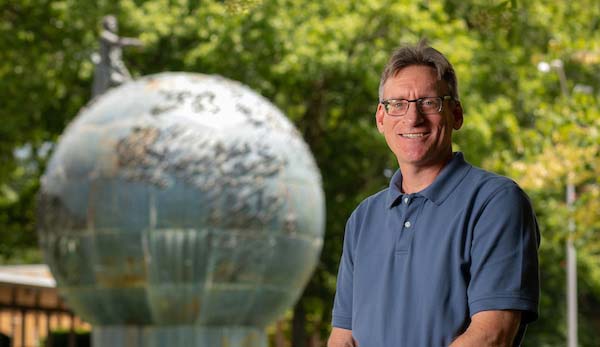Kennesaw State professor’s research validates value of Peace Corps
KENNESAW, Ga. (Jul 16, 2021) — Kennesaw State University’s Thomas Nisley (Dominican Republic 1989-91)) has delved deeply into the Peace Corps, first as a volunteer worker helping communities in need and then as an academic researcher. His study indicates that the international assistance program is a significant and cost-effective component of the United States’ foreign affairs.
That finding is particularly significant, Nisley contends, since last year the Peace Corps withdrew all its volunteers worldwide from their host sites — nearly 7,000 people serving in 60 countries — due to the COVID-19 pandemic. While Congress has authorized federal funding throughout the Peace Corps’ six-decade history, Nisley is concerned that the ongoing volunteer hiatus potentially could threaten further financial support for the Peace Corps and hinder its long-term future.
“We have lost a year of what I often refer to as field-deployed public diplomacy,” said Nisley, a political science professor in KSU’s School of Government and International Affairs. “I think it’s vital for the Peace Corps to return to normal, and I’m hopeful that it will. My research suggests that the Peace Corps is a relatively inexpensive component to U.S. foreign policy that provides many returns.”
Sparked by his experience volunteering in the Dominican Republic in his early 20s, Nisley began researching the effectiveness and value that the Peace Corps has in Latin America. His research has been published in academic journals and in his first book, The Peace Corps and Latin America: In the Last Mile of U.S. Foreign Policy, which was published in 2018 and will come out in paperback in August.
Rather than being a memoir of Nisley’s two years in the Peace Corps, though, his book is an academic study. Nisley looked at several countries’ Peace Corps programs and participation at different points in time, and evaluated how effectively those carried out the Peace Corps’ goals to bolster world peace and friendship and promote a better understanding between Americans and people of other countries.
“The evidence shows that, in the countries that have more Peace Corps volunteers than others, and for a longer period of time, the people there have a more positive perspective of the United States,” Nisley said. “At the same time, the volunteers themselves gain an experience that far exceeds anything they could acquire through academic study or even a study abroad experience.”
Nisley also credits his time in the Peace Corps with inspiring him to become a university professor. One of his service projects in the Dominican Republic was teaching English to members of a youth group, and he found that he enjoyed it and had a knack for it. Nisley began teaching in higher education after earning his Ph.D. in 2002, joined the faculty of Southern Polytechnic State University in 2005 and came to Kennesaw State in 2015 when SPSU and KSU consolidated.
“Kennesaw State’s emphasis on research has been very beneficial to me,” Nisley said. “It gave me the resources and the encouragement to write this book.”
In addition to the political science and government courses he teaches at KSU, Nisley gives a lecture about the Peace Corps each semester to a careers class for international affairs majors. Some students have gone on to serve in the Peace Corps, he said.
However, Nisley cautions that serving in the Peace Corps isn’t for everybody. He describes his living quarters in the Dominican Republic as “a palm wood shack with a little gas stove, a mosquito net and an outhouse.” In times when he was short on food, Nisley would drink coffee to curb his hunger.
“It’s not a comfortable life, but I think it’s a good experience,” Nisley said. “I went into the Peace Corps because I wanted an adventure, and I certainly got an adventure.”
•
 The Peace Corps and Latin America: In the Last Mile of U.S. Foreign Policy
The Peace Corps and Latin America: In the Last Mile of U.S. Foreign Policy
Thomas J Nisley (Dominican Republic 1989-91)
Lexington Books
2018
158 pages
$95.00 (hardcover), $39.99 (paperback), $37.99 (Kindle)


Very interesting. I’ve wondered since the Covid recall if other countries postings to their slightly different forms of Peace Corps-like endeavors were also recalled. When I was serving in South India there were two foreign demonstration farms nearby. One was Japanese and the other Danish. We got on quite well with both groups, at times borrowing machinery like hybrid maize shellers from the Japanese and getting great all around support from the Danes as well. About halfway through our time there the Danes were recalled and sent to Thailand to work. Before leaving they asked if I would take over their demonstration farm. Peace Corps in Bangalore however nixed the idea which I thought then and now was a short-sighted decision. When I finally left India I stopped at the Dane’s new Thai farm and spent an enjoyable time there before heading off to Laos. Years later one of the Danes showed up on my doorstep and spent a few weeks with me as I showed them New England. Great people!
I served in Colombia 1963-1965. The book is very expensive in all its formats. But, I was able to order it
via Inter-library loan. I am really looking forward to reading it.
I read Nieley’s Book. I found it an overview of US policy, including the role of Peace Corps in Latin America. Nieley speaks of the Three Goals, but I think the one he really documents is the Second Goal: to help promote a better understanding of Americans on the part of the peoples served. He uses Sociology theory to explain how people in close contact and working toward common goals develop good relationships. He also cites statistical data showing the favorable attitude toward the United States in countries which have had Peace Corps Volunteers.
Nieley is critical of the so-called Five Year Rule, but he is unaware of Dr. Textor, who voiced exactly some of the same concerns! Absent a Peace Corps library, or even a digital catalog of all Peace Corps works it is almost impossible for researchers to find or access the history of Peace Corps. Perhaps Nieley and the many others RPCVs on his college’s staff may initiate one.